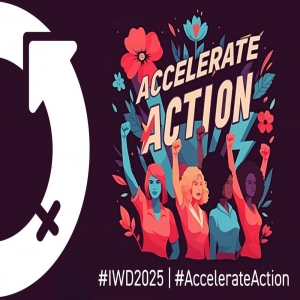

International Women's Day, with its theme 'Accelerate Action,' provides an opportunity to examine data related to India's gender equality.
The Economic Survey 2025 reveals a significant increase in the Female Labour Force Participation Rate, from 23.3 per cent in 2017-18 to 41.7 per cent in 2023-24. Additionally, women-led entrepreneurship is expanding, with over 73,151 start-ups featuring at least one woman director. The uneven corporate and political representation of women merits improvement. Data from the Public Enterprises Survey 2022-23 indicates limited female representation on Central Public Sector Enterprise (CPSE) boards, with only 39 women serving as Functional Directors out of 521.
Similarly, whilst women contesting general elections have risen from 3 per cent in 1957 to 10 per cent in 2024, the 18th Lok Sabha has only 75 women members (14 per cent), and the Rajya Sabha has 39 women (17 per cent). Conversely, local governance at Panchayati Raj Institutions shows greater equity, with 14.5 lakh Elected Women Representatives (46 per cent). India has a woman in the highest constitutional office, which speaks to the nation's potential for progress in gender equality.
In contrast to the mixed landscape of political representation, economic indicators and social norms offer further insights into women's status. Economic data shows 88.7 per cent of married women participate in household decisions, whilst 25.4 per cent of working women (15-49 years) are paid in cash, and 78.6 per cent have bank accounts, which is a good sign of social progress. The Global Gender Gap Report 2024 indicates a global gap of 31.5 per cent, with India closing 64.1 per cent (ranking 129th). The report highlights economic parity and political representation as focus areas.
Demanding urgent social norm shifts, the latest UNDP Gender Social Norms Index reveals that nearly 90 per cent of people worldwide hold biases against women, a figure unchanged in a decade. Such prejudices, spanning political, economic, educational and physical integrity domains, are a major barrier to gender equality and the Sustainable Development Goals.
Building upon these observations of economic indicators and social norms, we observe a shift as fathers increasingly promote gender equality in their daughters' lives. This shift, sometimes termed the "girl-dad" concept, is increasingly visible globally and in India, where it reflects changing family values and a desire for nurturing egalitarian relationships.
However, interpretations of this evolving fatherhood role vary. This shift can be woven into the discussion of social norms and cultural change.
Arguments for this shift highlight its potential to create positive role models, empower daughters, and advance social progress. Concerns exist regarding cultural sensitivity, potential performative actions, and oversimplification. A balanced approach emphasises behavioural changes, adaptation to the Indian context, and inclusive fatherhood.
Despite these evolving societal norms, significant health and social challenges persist, presenting obstacles to gender equality. Beyond nutritional challenges, violence against women remains a critical issue.
The National Family Health Survey (NHFS 2019-2021) shows 57 per cent of women aged 15-49 are anaemic, up from 53 per cent in 2015-16. Anaemia in Indian women stems from shared and distinct factors across rural and urban settings: both groups face dietary iron deficiencies, menstruation/pregnancy-related blood loss, and socioeconomic limitations affecting access to nutrition and healthcare; however, rural women experience poorer healthcare access, parasitic infections, limited food variety, and heavy labour, whilst urban women face sedentary lifestyles, processed food diets, and supplement compliance challenges.
NFHS-5 (2019-2021) reveals that nearly one-third of Indian women aged 18-49 have experienced physical violence, with spousal abuse a major contributor. Notably, only a tiny percentage of victims report these incidents. The survey also reveals significant regional disparities in domestic violence rates. Whilst education and economic stability offer some protection, the data underscores the pervasive nature of violence against women in India, emphasising the need for immediate action and increased public awareness.
Compounding these issues, further social challenges remain. Whilst child sexual abuse rates show regional variations and a decline, underreporting is a concern. Rural areas see higher rates of sexual violence against women under 18. Domestic violence is also increasing. Educational progress exists at the primary level, but disparities remain at higher levels.
Though India has established legal frameworks for women's rights, including the Protection of Women from Domestic Violence Act and the Sexual Harassment of Women at Workplace Act, in "response" to these persistent health and social challenges, the actual implementation is far from satisfactory. The judiciary must reinforce gender equality through advocacy, education, and accountability.
A multi-pronged approach is needed to accelerate progress, including actions across education, health, economic policies, and societal attitudes. Educational initiatives focused on gender norms are essential. Sustained economic advancement requires closing the gender gap in economic participation. Therefore, legal frameworks, education, economic empowerment, and social development must all be addressed through continuous evaluation and policy refinement.
On this International Women's Day, let us commit to "Accelerate Action" in the pursuit of gender equality.